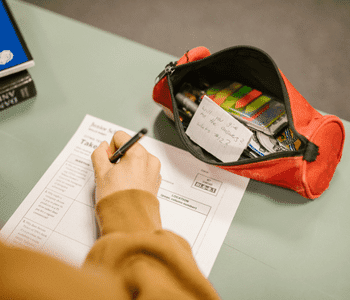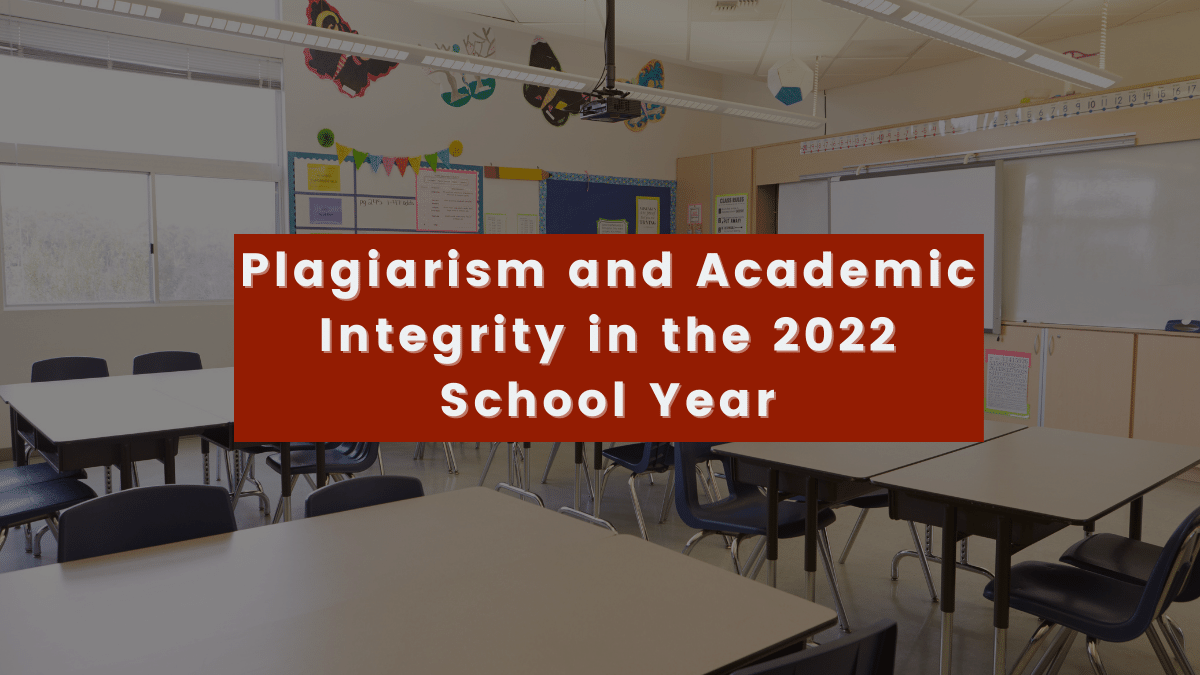Plagiarism and Academic Integrity in the 2022 School Year

Depending on the school, the fall 2022 school year has either started, or is starting imminently.
For many, this school year is unusual, specifically because it’s so normal. The 2020 and 2021 school years were altered heavily by the COVID-19 pandemic, creating a push to distance learning as schools struggle to stay open.
Though distance learning is here to stay and education will likely never look exactly like it did in 2019, 2022 is still marks a return to something that as close to that previous norm as possible.
But one of the things that the pandemic changed with academic integrity was academic integrity. According to most studies, academic integrity issues rose drastically with the pandemic, driven by a combination of the forced shift to distance learning, uncertainty among students and an increased ease of cheating.
However, as students return to the classroom, many of those issues are being lifted. But that doesn’t mean that things will return to normal when it comes to academic integrity. Instead, it’s very likely that many of the issues present in the pandemic will remain while, at the same time, many new challenges and opportunities are on the horizon.
With that in mind, here is a look at just some academic integrity issues that educators should be watching for in the 2022 school year.
1: New Tools to Detect Contract Cheating
In many ways, the fight to detect plagiarism has shifted drastically over the past decade. Services such as Turnitin and Unicheck have made it much more difficult to get away with copy and paste plagiarism. That caused many students to look to contract cheating, either locally or through online essay mills.
Contract cheating is a much more complicated issue to detect and stop as one can’t simply search for the text. As such, a variety of different approaches have taken shape. For example, Turnitin began offering an AI-powered tool to detect authorship in 2018 and Unicheck began work on their system the year before.
However, that fight has not remained static. All the key players in the field have worked to improve their tools, and new ones are being developed right now. Academic Influence, for example, just released a new free tool that aims to help quantify authorship and still others are being developed and nearing some release.
Simply put, contract cheating is a major focus when it comes to plagiarism prevention and detection. As such, expect to see rapid growth for tools to address this issue.
2: Changing Assessment with Cheating in Mind
In many classrooms, assessment has gone largely unchanged for decades. The pandemic forced change but, as students return to physical classes, many of those lessons are sticking.
There are as many ways to approach this issue as there are teachers in the world. The approaches include giving more frequent but shorter tests, timing tests, randomizing question order per student and requiring more drafts on written assignments and more.
However, the big challenge is crafting assessments that are resistant to cheating and plagiarism, but don’t require more work from instructors. Teachers are routinely being tasked with doing more with less, so additional work in this space is likely counterproductive.
This has shifted the focus to finding assignment types that are resistant to cheating and creating testing environments that make cheating more difficult.
One thing that is clear is that, if we want our assessment to be relatively free of cheating, one of the first steps is likely rethinking assessment itself. The pandemic forced many schools to do just that, and the trend isn’t likely to stop just because students are returning to the classroom.
3: Increased Litigation Around Academic Integrity
Due to the increased costs of education, in particular in the United States, academic tribunals are rapidly becoming high-stakes operations where students may see tens or hundreds of thousands of dollars go to waste as they are unable to complete their education as planned.
For a long time, there has been a trend of students not accepting the outcome of their school’s academic integrity process and, instead, taking the matter to courts of law. This has been especially true in cases where schools have sought to revoke degrees after they were awarded, often due to plagiarism or other misconduct issues in the student’s thesis or dissertation.
Historically, courts have been reluctant to step in and generally have stayed out of academic matters. However, recent cases have shown a greater inclination to intervene, including a 2019 decision where a state court ruled the University of Texas did not have the right to revoke a doctorate over allegations of scientific misconduct.
The case looked closely at the process UT made their initial determination. Specifically, the former student claimed that the system didn’t provide due process and was a “kangaroo court” rather than a real system.
Simply put, the judgment of universities is being increasingly questioned by the courts and schools need to respond by ensuring that their internal processes offer plenty of opportunity for the accused to respond and that they are granted due process.
Bottom Line
One of the interesting things about the 2022 school year is that, in many ways, it’s both a continuation of the lessons learned from the pandemic years and from the issues that were taking shape just before.
To be clear, many of the pandemic’s impact on education will be permanent. Distance learning isn’t going away, schools are being pushed to be creative with both instruction and assessment, and the nature of the classroom itself is changing. However, the pandemic also put a lot of issues on hold and those challenges are coming back too.
Whether these are the legal issues mentioned above, the continued rise of contract cheating or just the inherent complexity in securing both fair and accurate assessment, schools have more space to focus on the long-term issues that were so dominant in the conversation before the pandemic.
It’s going to be an interesting school year when it comes to academic integrity, and one that I don’t think many schools are fully prepared for.
Want to Reuse or Republish this Content?
If you want to feature this article in your site, classroom or elsewhere, just let us know! We usually grant permission within 24 hours.
